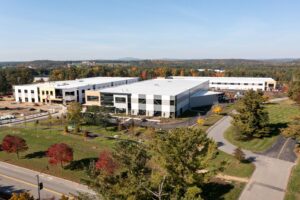
As life science demand wanes, developers are increasingly marketing new projects to Massachusetts’ growing clean energy sector. Pictured is King Street Properties’ Pathways campus at Devens, which recently signed an 187,236-square-foot lease with Natick-based Electric Hydrogen Co. Photo by Damianos Photography | Courtesy of King Street Properties
Flush with funding from venture capital and new federal programs, clean energy companies are generating growing demand for commercial real estate in Greater Boston.
Massachusetts’ emergence as a potential green power hub comes at a critical time for the suburban real estate market, amid declining demand for life science lab and biomanufacturing facilities. Some developers that had planned lab or cGMP drug manufacturing facilities now are eagerly courting the clean energy sector, which has similar building requirements.
“There’s been a significant rise in clean energy demand that is now neck-and-neck with biomanufacturing,” said Tyson Reynoso, a partner at Boston-based King Street Properties.
The growing local industry cluster includes solar, geothermal, hydrogen power and battery companies, all pursuing alternatives to carbon-based energy. Such firms typically need a combination of office, research and manufacturing space in flex buildings with ample power supplies, real estate executives say.
According to research by brokerage Hunneman, clean energy companies have inked nearly 1 million square feet of leases in Greater Boston since early 2022, ranging from high-end office headquarters in Back Bay to large-scale manufacturing and R&D facilities in outer suburbs.
“Life science is in a tough spot and [clean energy] has really picked up the slack enormously,” said Mark Fallon, director of research and strategy at Boston-based Hunneman. “It’s the kind of thing where the ingenuity of Massachusetts brings the cream to the top. It’s certainly not a fad.”
From a rent standpoint, clean energy facilities represent a higher-income opportunity for developers than traditional industrial uses such as warehouse, but a lower tier than life science facilities, Fallon said.
Federal grants from the Inflation Reduction Act (IRA) and an uptick in venture capital awards to local clean energy companies are spurring expansion by Massachusetts clean energy firms. The IRA is steering $369 billion in federal funding to the clean energy sector over the next decade.
Driven by new federal clean energy incentives, the industry received $150 billion in investment between August 2022 and April 2023, according to data from the American Clean Power Association.

According to research by brokerage Hunneman, clean energy companies have inked nearly 1 million square feet of leases in Greater Boston since early 2022. iStock photo
Pathways Pivots to Green Power
At its Pathways campus rising at the Devens business park in central Massachusetts, King Street Properties plans to break ground this year on two speculative buildings at 57 and 75 Jackson Road that could accommodate clean energy firms.
Typically, clean energy companies require manufacturing space as a primary use, along with office and sometimes lab and warehouse space under the same roof, King Street Properties’ Reynoso said.
Similar to biotech companies that prioritize investing in research rather than real estate, clean energy companies are seeking favorable deals in negotiating with landlords, Reynoso said. That typically translates into generous tenant improvement allowances.
The 4,400-acre Devens business park elevated its profile in the clean energy industry in 2021, when Commonwealth Fusion Systems announced plans for a five-building campus on 47 acres. The MIT spinoff is developing a carbon-free fusion reactor using hydrogen to generate emission-free electricity.
King Street Properties completed the first building, Commonwealth Fusion’s 165,000-square-foot headquarters and manufacturing facility, which opened in late 2022 at 111 Hospital Road.
King Street Properties’ five-building, 750,000-square-foot Pathways campus at Devens was originally marketed primarily to biomanufacturing companies, and signed its first lease in 2022 with Azzur Cleanrooms, which provides biomanufacturing suites.
But as life science expansion has slowed in the past year amid a more conservative funding climate, the development has seen more momentum in clean energy leasing.
In May, Natick-based Electric Hydrogen Co. leased 187,236 square feet at 33 Jackson Road at Devens, where it will manufacture electrolysers used in hydrogen production of hydrogen. The company’s technology is designed for large industrial companies such as fertilizer and steel factories seeking carbon-free power sources.
And on July 13, the Devens Enterprise Commission, which functions as the land-use board for the business park, gave its OK for manufacturing uses at King Street’s 100,000-square-foot 39 Jackson Road building currently under construction. The developer is in negotiations with Ascend Elements on a full-building lease, according to a letter submitted by King Street Properties to the commission.
Westborough-based Ascend Elements has received a combined $680 million in funding since October from the U.S. Department of Energy and venture capital investors. In June, it announced that it landed a $1 billion contract to supply the electric vehicle market.
Elsewhere in the suburbs, developments initially envisioned as office-to-life science conversions have landed clean energy firms instead.
In Watertown, Via Separations leased 50,000 square feet at Berkeley Investments’ 64 Pleasant St., the former headquarters of architects Sasaki.
In Burlington, the office park formerly known as Network Drive is adding clean energy R&D facilities to its existing office and life science uses. Developer Nordblom Co. signed a deal in May with Beverly-based Nth cycle, which recycles electronic components, for 46,000 square feet of office and lab space at 15 Blue Sky Drive.
Incubator Graduate Expands in Charlestown
Clean energy startups graduating out of Somerville’s Greentown Labs are generating significant leasing demand.

Steve Adams
The 100,000-square-foot campus currently houses 123 startups and has a 90-day waitlist for its prototyping lab space, spokeswoman Julia Travaglini said.
Among the recent Greentown Labs graduates filling commercial spaces in the urban market is Line Vision, which manufactures monitoring equipment for power transmission lines including integration of renewable sources into the grid. The firm relocated into a new 30,000-square-foot headquarters at The Flatley Co.’s Schrafft Center in Charlestown last December.
And battery maker Form Energy leased 96,000 square feet this spring at 200 Inner Belt Road in Somerville for expansion. The company also has a 55,000-square-foot research facility at 30 Dane St. in Somerville.
Joe Curtatone, the former Somerville mayor and now president of the Northeast Clean Energy Council, said the federal government’s investment in clean energy through the IRA has catalyzed private investment.
“It’s taken away early-stage risk and unlocked opportunities for the private sector,” Curtatone said. “The climate economy, with the push to decarbonization, is the animating factor of the entire economy. We know we have to decarbonize everything everywhere.”





